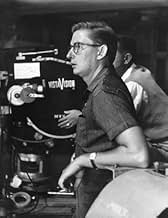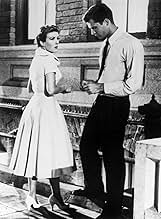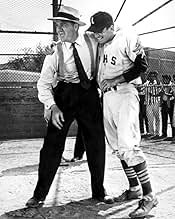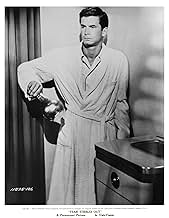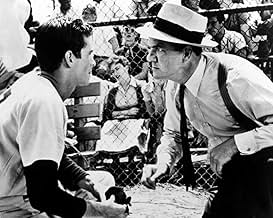AVALIAÇÃO DA IMDb
6,9/10
2,3 mil
SUA AVALIAÇÃO
Adicionar um enredo no seu idiomaTrue story of the life of Jimmy Piersall, who battled mental illness to achieve stardom in major league baseball.True story of the life of Jimmy Piersall, who battled mental illness to achieve stardom in major league baseball.True story of the life of Jimmy Piersall, who battled mental illness to achieve stardom in major league baseball.
- Direção
- Roteiristas
- Artistas
- Prêmios
- 1 indicação no total
John Aberle
- Ballplayer
- (não creditado)
Eric Alden
- Policeman
- (não creditado)
Heather Ames
- Nurse
- (não creditado)
Sam Balter
- Broadcaster
- (narração)
- (não creditado)
Mary Benoit
- Nurse
- (não creditado)
John Benson
- Reporter
- (não creditado)
Don Brodie
- Reporter Evans
- (não creditado)
Richard Bull
- Reporter Slade
- (não creditado)
Bart Burns
- Joe Cronin
- (não creditado)
Edd Byrnes
- Boy in Car Assisting Jimmy Up Stairway
- (não creditado)
Wade Cagle
- Intern
- (não creditado)
Keith Coyne
- Baby
- (não creditado)
Avaliações em destaque
This is not what one would call a pleasant film to watch particularly about Baseball. It tells the true story of former major league ball player Jim Piersall of the Boston Red Sox and his eventual mental breakdown. While certain events are not exactly the way they took place the story nonetheless sticks pretty much to fact. Anthony Perkins puts in a dynamic performance as Piersall. A kid who likes baseball but is driven to madness by his domineering perfection minded father played by Karl Malden. Also included in the cast is Norma Moore as Jims devoted wife Mary and Adam Williams as the psychiatrist Doctor Brown.
The first half of the picture deals with Piersall growing up practicing and playing baseball always under the scrutiny of his father. Whatever Jim did on the playing field it could always have been done better according to his Dad. The second half of the film deals with Piersalls mental breakdown and subsequent treatment and recovery. While watching a ball game on TV he makes remarks that his doctor picks up on and uses to unlock the reason why he cracked up. These same circumstances are no doubt still occurring today as many parents push their children relentlessly in everything from sports to academics to beauty pageants. Jim Piersalls story fortunately became a book and later this fine film that perhaps has and will continue to serve as a message to those who watch it. Whether you're a baseball fan or not this is a movie to be seen.
The first half of the picture deals with Piersall growing up practicing and playing baseball always under the scrutiny of his father. Whatever Jim did on the playing field it could always have been done better according to his Dad. The second half of the film deals with Piersalls mental breakdown and subsequent treatment and recovery. While watching a ball game on TV he makes remarks that his doctor picks up on and uses to unlock the reason why he cracked up. These same circumstances are no doubt still occurring today as many parents push their children relentlessly in everything from sports to academics to beauty pageants. Jim Piersalls story fortunately became a book and later this fine film that perhaps has and will continue to serve as a message to those who watch it. Whether you're a baseball fan or not this is a movie to be seen.
FEAR STRIKES OUT dealt with a theme not often portrayed in films of the '50s--mental illness--and is a shattering example of how a father's insistence on perfection can have a significant effect on the well being of a sensitive individual unable to meet his father"s expectations. Marketed at time of release as a baseball movie, it's really a relationship movie about a father and son--that is the real heart and soul of the story.
Based on the real life story of Jim Piersall, a well known American sports figure for the Boston Red Sox, as taken from his own account of his life. Slowly the picture emerges of the kind of stress he was under to achieve his goal of playing in the majors, the kind of guilt he felt whenever he did something that aggravated his father--as in simple disobedience when he didn't come straight home after work and then broke his ankle at an ice skating rink.
Even in the midst of achievements, his father finds flaws to criticize. "Wish me luck," he pleads with his father when the Red Sox signs him. "No, luck won't do it. You've got to be thinking and planning all the time."
And later on in the film, after his breakdown and he lands in a mental asylum, he defends his father to his psychiatrist with, "If it hadn't been for him pushing me and driving me, I wouldn't be where I am today!" Chilling words and the scene is the turning point in Piersall's progress toward recovery and the root cause of his problems.
It's the sort of film everyone can relate to, sports minded or not, because it does reveal the danger of parents who expect too much from their children, with tragic results. The scene where Malden tries to take him from the hospital before he's ready to go, is a chiller.
Both ANTHONY PERKINS and KARL MALDEN give the kind of performances that merited at least Oscar nominations--solid and superb.
Summing up: A satisfying, mature drama that takes a penetrating look at the danger of pressure-driven father/son relationships in the sports world where winning is the only thing that counts.
Based on the real life story of Jim Piersall, a well known American sports figure for the Boston Red Sox, as taken from his own account of his life. Slowly the picture emerges of the kind of stress he was under to achieve his goal of playing in the majors, the kind of guilt he felt whenever he did something that aggravated his father--as in simple disobedience when he didn't come straight home after work and then broke his ankle at an ice skating rink.
Even in the midst of achievements, his father finds flaws to criticize. "Wish me luck," he pleads with his father when the Red Sox signs him. "No, luck won't do it. You've got to be thinking and planning all the time."
And later on in the film, after his breakdown and he lands in a mental asylum, he defends his father to his psychiatrist with, "If it hadn't been for him pushing me and driving me, I wouldn't be where I am today!" Chilling words and the scene is the turning point in Piersall's progress toward recovery and the root cause of his problems.
It's the sort of film everyone can relate to, sports minded or not, because it does reveal the danger of parents who expect too much from their children, with tragic results. The scene where Malden tries to take him from the hospital before he's ready to go, is a chiller.
Both ANTHONY PERKINS and KARL MALDEN give the kind of performances that merited at least Oscar nominations--solid and superb.
Summing up: A satisfying, mature drama that takes a penetrating look at the danger of pressure-driven father/son relationships in the sports world where winning is the only thing that counts.
If this story were filmed today, the treatment would be much more stark and realistic. But for a film in the mid-50s, it provided quite a punch in conveying the agony of growing up with a loving but very demanding father. When I saw it in the theater, I never questioned Anthony Perkins as a teenager in the first part; today, this is much more difficult to swallow. Even though dated somewhat, the film is still worth a watch.
Karl Malden is excellent as a father driven by his own sense of failure to attempt to live vicariously through his son. As a result, he literally orchestrates his son's life. Never accepting the `glory' of the moment, he places constant expectations and demands on his son. Possibly this is Malden's best role.
Tony Perkins has some fine moments of anguish and neuroticism as the ball player, Jimmy Piersall. One scene between his father and him after his breakdown is superbly acted with Perkins running through a panoply of emotions. That this emotional turmoil is somewhat subdued is to the credit of the film. Norma Moore gives a competent and rather understated performance as his wife. The doctor, played by Adam Williams, is appropriately comforting, but he's not up to delivering the big line, especially in his intense scene with Malden. Regretfully, Perry Wilson as Piersall's submissive mother, didn't have more of a role.
Some very nice photography using the angularity of steps and bleachers and railroad stations conveys the underlying jaggedness and tension of emotions. Elmer Bernstein's soundtrack is effective in supporting the mood of the film.
Karl Malden is excellent as a father driven by his own sense of failure to attempt to live vicariously through his son. As a result, he literally orchestrates his son's life. Never accepting the `glory' of the moment, he places constant expectations and demands on his son. Possibly this is Malden's best role.
Tony Perkins has some fine moments of anguish and neuroticism as the ball player, Jimmy Piersall. One scene between his father and him after his breakdown is superbly acted with Perkins running through a panoply of emotions. That this emotional turmoil is somewhat subdued is to the credit of the film. Norma Moore gives a competent and rather understated performance as his wife. The doctor, played by Adam Williams, is appropriately comforting, but he's not up to delivering the big line, especially in his intense scene with Malden. Regretfully, Perry Wilson as Piersall's submissive mother, didn't have more of a role.
Some very nice photography using the angularity of steps and bleachers and railroad stations conveys the underlying jaggedness and tension of emotions. Elmer Bernstein's soundtrack is effective in supporting the mood of the film.
I still remember seeing this as a Little League-age kid in the theater as our family was vacationing in Florida.
When I saw it again, some 40 years later, parts of the film were still very familiar, a testimony to how powerful some of these scenes were. I never forgot them.
This was a based-on-a-true-life account of major league baseball player Jimmy Piersall, a very talented player who suffered a nervous breakdown. The enormous pressure to succeed that was driven into him by his never-satisfied father was pictured as the cause which made him snap.
Anthony Perkins, who plays Piersall, and Karl Madlen, who portrays his dad, are both excellent, riveting characters. Some say this was Malden's best performance ever. Perkins was no slouch, either. This is the classic sports story of an overzealous parent living his or her dreams through their child.
The baseball segment of this film ended about halfway through. From that point, after Perkins breaks down at the park, climbing the backstop fence in a horrifying scene, the film actually gets even more interesting with everyone in the film contributing although the cast, after Perkins and Malden, is a pretty much an unknown-name one.
The only unrealistic part of the film, typical of sports films until the 1980s, was seeing an actor play a ballplayer when he "throws like a girl," as the old expression went. The younger actor playing Piersall as a kid was no better than Perkins in this regard. Neither had a clue how to a throw a ball. It looks corny nowadays.
Oh, well. That wasn't the focus of the story, anyway. As powerful as this film was, it apparently didn't have much of an effect as pushy parents in sports still exist and probably always will, taking the fun out of sports for a number of kids.
It's still a memorable film and worth your time today, especially if you have never seen it.
When I saw it again, some 40 years later, parts of the film were still very familiar, a testimony to how powerful some of these scenes were. I never forgot them.
This was a based-on-a-true-life account of major league baseball player Jimmy Piersall, a very talented player who suffered a nervous breakdown. The enormous pressure to succeed that was driven into him by his never-satisfied father was pictured as the cause which made him snap.
Anthony Perkins, who plays Piersall, and Karl Madlen, who portrays his dad, are both excellent, riveting characters. Some say this was Malden's best performance ever. Perkins was no slouch, either. This is the classic sports story of an overzealous parent living his or her dreams through their child.
The baseball segment of this film ended about halfway through. From that point, after Perkins breaks down at the park, climbing the backstop fence in a horrifying scene, the film actually gets even more interesting with everyone in the film contributing although the cast, after Perkins and Malden, is a pretty much an unknown-name one.
The only unrealistic part of the film, typical of sports films until the 1980s, was seeing an actor play a ballplayer when he "throws like a girl," as the old expression went. The younger actor playing Piersall as a kid was no better than Perkins in this regard. Neither had a clue how to a throw a ball. It looks corny nowadays.
Oh, well. That wasn't the focus of the story, anyway. As powerful as this film was, it apparently didn't have much of an effect as pushy parents in sports still exist and probably always will, taking the fun out of sports for a number of kids.
It's still a memorable film and worth your time today, especially if you have never seen it.
This a very interesting, but not totally factual, account of the life of Jimmy Piersall. Piersall was a popular player with the Boston Red Sox. His antics on and off the field are now legendary. Piersall fell in love with baseball at a young age, but his domineering father forced Jimmy to not only achieve, but to play to perfection. Mr. Piersall's constant manipulating can be traced to his son's mental breakdown.
Anthony Perkins puts in a dedicated performance as Jimmy Piersall. Karl Malden excelled as the relentless Mr. Piersall. Also in the cast are Bart Burns, Norma Moore and Adam Williams.
This is a very stark and interesting movie, just don't take all the content as gospel. A baseball fan's delight.
Anthony Perkins puts in a dedicated performance as Jimmy Piersall. Karl Malden excelled as the relentless Mr. Piersall. Also in the cast are Bart Burns, Norma Moore and Adam Williams.
This is a very stark and interesting movie, just don't take all the content as gospel. A baseball fan's delight.
Você sabia?
- CuriosidadesThe real Jimmy Piersall disowned the movie due to its distortion of the facts. Based on the success of his autobiography and the movie, Piersall penned a second book in 1985 called The Truth Hurts, which detailed his ousting from the White Sox organization.
- Erros de gravaçãoClose-up shots of Jimmy Piersall playing shortstop and right field reveal a low outfield wall backed by trees in the background. These games were supposed to be in Fenway Park, which would have a high left field wall and bleachers in right field.
- Citações
Jim Piersall: I don't care what happens. I love you Mary!
- ConexõesFeatured in Diamonds on the Silver Screen (1992)
Principais escolhas
Faça login para avaliar e ver a lista de recomendações personalizadas
- How long is Fear Strikes Out?Fornecido pela Alexa
Detalhes
- Data de lançamento
- País de origem
- Idioma
- Também conhecido como
- Fear Strikes Out
- Locações de filme
- Empresa de produção
- Consulte mais créditos da empresa na IMDbPro
- Tempo de duração
- 1 h 40 min(100 min)
- Cor
- Proporção
- 1.85 : 1
Contribua para esta página
Sugerir uma alteração ou adicionar conteúdo ausente


